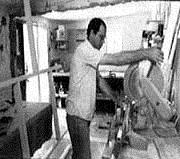
How dangerous is the Palestinian economy? Is it dangerous enough to have trade barriers imposed on it? Is the Palestinian economy such a staunch rival, that fellow Arab States need to engage in a trade war with it? Finally, do Arab States take America's protective measures with respect to its trade with the European Union as a formidable precedent?
The European Union and the United States of America have been engaged in an economic trade battle for a good ten years. The dispute lies in their competitive nature, with each seeking to protect and promote their respective goods and services domestically and on the international arena through several means, such as; trade barriers, (limited quotas, raised import taxes, minimum standard requirements) government subsidies for domestic businesses and import substitution policies. At the heart of this dispute lie the protective measures adopted by the US for companies like: General Electric, Microsoft and Boeing. Furthermore the Agricultural sector has been another focal point, with the US imposing trade barriers on EU beef products as well as, bananas.
The Palestinian economy small as it is, is in dire need of revitalization, reconstruction and renewed foreign investment. According to the World Bank it is estimated that investments of up to $5 billion would be needed to rebuild the infrastructure of Palestinian cities. Almost four years of repeated Israeli incursions, border blocks and curfews have been fatal to the Palestinian economy, virtually suffocating it and hindering the natural business cycle from taking its course.
The figures speak for themselves, according to the International Labour Organization’s (ILO) Annual Report of 2003; Palestinian unemployment lies at 25.6% as opposed to 45.2% in 2002, Gross Domestic Product lies at $4 billion as opposed to $5 billion in 2000 amounting to a 20% decrease in total GNP, Palestinian exports fell to $353 million in 2002 from $763 million in 1999, according to the Palestine Trade Centre (PalTrade) foreign trade has plunged a remarkable 50%. Finally the Palestinian economy has an annual aggregate trade deficit of approximately $2 billion, which constitutes about 50% of the total GNP.
In an effort to counter the problems facing the Palestinian economy, the Arab Palestinian Private Sector Forum commenced on Monday September 6th, at a Dead Sea resort in Jordan, to find possible remedies to help the ailing Palestinian economy. Issues discussed on the agenda were:
- Linking economic relief to economic and social development.
- Collaborative investment in the Palestinian private sector
- Opening free-trade channels with Arab countries (lowering entry barriers for Palestinian goods and services)
- Enhancing inter-Arab private sector partnerships
- Transferring technology and technical aid.
Prior to the workshop that took place in Jordan Samir Hulileh, chairman of the board of directors at PalTrade said in a press conference that, “Palestinian businessmen have repeatedly called on Arab governments and their private sectors to open their markets to Palestinian products and to stop looking at their fellow Arabs as merely resistance fighters against Israeli occupation. They should start looking at them as potentially successful business partners.”
Even though Israel has trade barriers vis a vis Palestinian exported goods and services, it remains Palestine’s biggest trade partner with 94.3% of all Palestinian exports going to Israel. Left with a mere 5.7% being traded with fellow Arab states. Countries such as Syria, Lebanon and Kuwait actually prohibit Palestinian goods from entering their countries, under the pre-text that this would mean recognizing, or in that matter making peace with Israel. However the simple question arises, what does trade with Palestine have to do with recognizing Israel? Other Arab countries such as the likes of Egypt and Libya actually have the audacity to impose trade barriers in an attempt to marginalise the quantity of Palestinian exports flowing into their countries. In someway these actions reflect the actual support Palestine receives on the political level. Funnily enough, Arab products are traded without entry barriers and are available duty-free in Palestine. Why not have trade relationships with Palestine, which is supposedly the number 1 cause in the Arab world, based on reciprocity.
Jordan, Saudia Arabia and the United Arab Emirates represent the only Arab states to comply with the 2001 Arab Summit resolution, “calling for an end to trade barriers, lifting political barriers and exempting Palestinian products from tariffs.” In another statement commenting on this issue Samir Hulileh went on to say, “The Arab world continues to support Palestine, for which we are very grateful. However, there is more that can be done. We urge Arab governments to translate their political backing into ones that can also build business partnerships.”
Palestinian exports come in the form of Non metallic mineral manufacturers, fruits and vegetables, iron and steel, furniture and mattresses, footwear, tobacco products, cork and wood and finally animal and vegetable fertilizers. Ironically the Palestinian National Authority has free trade agreements with Israel, the USA, Canada, the EU, Switzerland, Liechtenstein, Iceland and Norway. With only partial agreements on free trade, with Egypt and Jordan. Left with the question what about the remaining 20 Arab states?
Pre-1948 Palestine possessed the most vibrant port of the entire Middle-East. The costal city of Haifa, stood as an example to other Arab states of the time of how to wreak the benefits of ones natural resources. It seems that half a century later, fellow Arab states are galvanised by the potential, the current virtually demolished Palestinian economy has.







